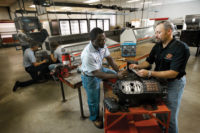According to current student Lon Schild, “Mr. Kalber and the program he has poured himself into is recognized by potential employers as a valued resource of quality educated employees.”
A Rich History
The Mechanical-Electrical Technology program at SCC has been in existence since 1954. According to Kalber, “The person really responsible for putting it all together was Richard E. Stockwell.”
Kalber was one of Stockwell’s students in 1963. He eventually returned and taught alongside the founder for a few years before Stockwell’s retirement. According to Kalber, Stockwell “had this idea of putting together a program which would benefit our industry in a rather unique way.”
Kalber explained, “What we do in the program is train people in stationary engineering, HVAC technology, and water/wastewater treatment. Stockwell’s idea was to make a very broad base of courses that can fit into many different areas; consequently, the students have a lot more options when they graduate.”
Since he returned to teach at the college where he started his career, Kalber has been dedicated to upholding its foundation and helping its students find jobs. “The whole goal of our program is to place every student,” he said.
Field in the Classroom
Kalber worked in many of the mechanical trades, as well as serving a stint in the U.S. Coast Guard, before he became an HVAC instructor. While teaching, he also started and owned two businesses. “I’m a workaholic,” he admitted. “I love this trade. I work a lot, but I enjoy working. And I think that’s part of what keeps me healthy and going.”
All of this work experience has aided him in teaching. “The fact that I’m able to do these things beyond teaching helps my teaching,” he said. “I can bring all those personal experiences back to the classroom and can relate very well.”
Schild said, “Mr. Kalber brings to the refrigeration education forum his successful business experiences, as well as a sound foundation of refrigeration principles. He not only taught refrigeration principles, but also integrity, honesty, and passion for the industry through his own character that demonstrated the same principles he was teaching.”
Exemplary Program
According to Kalber, the program at SCC is “pretty intense — there are a lot of courses students take, so they get a solid background very quickly.” He added that the program has always emphasized working “half with your minds, half with your hands.” He tells students, “Use your mind to think problems and details through so you don’t make mistakes.”
Working with his advisory council, he has taken suggestions and advice to keep current with the industry. “We’ve made a lot of advancements,” he said, including offering new certificate programs. The program offers a one-year certificate that enables students to find entry-level facilities maintenance jobs. The point of this certificate, Kalber said, is to “help students find that first job, and then they continue with school.”
The program offers a second certificate as well, and students can earn degrees if they also fulfill the college’s general education requirements. Kalber recently worked with another instructor to create an advanced certificate for commercial building energy auditing and commissioning.
He is also proud of the water/wastewater treatment certificate his program offers. “To ramp up the skill set students get, we started working cross campus with the chemistry and biology departments. The students not only take our courses, but they also take those to complete their certificate. It’s a big deal and really different from what most other colleges would offer for water treatment [education].”
Kalber added that the students have a great opportunity to get hands-on training at SCC because “instead of the campus providing heating and cooling for our buildings, we provide our own.” He noted that they have a chiller system, steam and hot-water boiler systems, split systems, packaged units, solar systems, and even an ice thermal storage system.
The whole system is operated by a Johnson Controls’ Metasys system, and in the computer labs, students actually get to operate the facility. “Having that opportunity to work on real equipment is exactly the same as if they went over to the administration building,” Kalber said. “They get that same exposure.”
A Helpful Philosophy
But it’s not just about the certificates and the facility. Kalber is also dedicated to helping students become successful. It can be difficult, he noted, to get them to think about their long-term career goals.
“My teaching philosophy is to help people help themselves,” he said. “If I can help them to the point where they can help themselves, then I feel I’ve accomplished something.”
So he doesn’t give away the answers. “When a student asks you a question, you answer it with a question,” he said. “Most of the time they know the answer, they just don’t know how to get there. You give them a little bit and then you ask a question to make them do the research and find those answers. I think that’s what makes people good troubleshooters.”
It’s all worth it, he said, when he watches students evolve. “The best part is seeing them come back after they’ve just got a job and they’re all jazzed,” he said. “At that point they realize the importance of their education.”
Publication date: 11/14/2011














